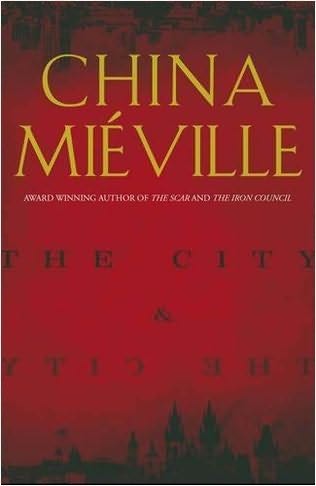'The City and the City' by China Mieville
 I'll start by saying that I am already a massive fan of China Mieville. I have immense respect for his fantasy/sci-fi (though I think i'll go for the term 'speculative' or 'weird' fiction) novels, namely 'Perdido Street Station', 'The Scar' and probably my favourite, 'Iron Council'. Curiously, amongst the fantasy die-hards, 'Iron Council' was somewhat reviled presumable due it's overt political nature, but to me this is why I have always enjoyed the work of China Mieville.
I'll start by saying that I am already a massive fan of China Mieville. I have immense respect for his fantasy/sci-fi (though I think i'll go for the term 'speculative' or 'weird' fiction) novels, namely 'Perdido Street Station', 'The Scar' and probably my favourite, 'Iron Council'. Curiously, amongst the fantasy die-hards, 'Iron Council' was somewhat reviled presumable due it's overt political nature, but to me this is why I have always enjoyed the work of China Mieville.An unabashed Marxist, and member of the SWP, - which by the way I do not necessarily support, being extremely wary as I am of any party line - this political stance has always bled into his fantasy works, not overt but present. The world's Mieville creates feel very real precisely because of the inequalities depicted, recognisable class structures and struggles between marginal groups (both Left and Right), militia, police, trade unions and so on. They also had some cool monsters in them, and he has a real committment to the fantastic/imaginative genre that lifts his work out of the realm of dreary politcal allaegory or anything so easily definable. As a man with a massive weak spot for the fantasy/sci-fi genre, it is incredibly refreshing to find a writer to use the genre intelligently.
Having said all this, his new novel 'The City and the City' jettisons much of the fantastical elements of his earlier novels, moving much more towards the 'weird fiction' category i.e. unclassifiable literature that melds genre with aplomb and ends up being much more interesting than so-called mainstream literary fiction. The language in this new novel is quite different from the baroque language used in Mieville's fantasy novels, instead consciously taking its cues from the hard-boiled, straight talking dialogue of Raymond Chandler; for, this novel is Mieville's foray into crime fiction, although a kind that you've probably never read before.
The influences on this novel are no secret - they're even mentioned in the Acknowledgements. Raymond Chandler, Franz Kafka, Philp K Dick and the utterly wonderful Bruno Schulz are all cited as impacting majorly on 'The City and the City', and as i'm a huge fan of all these writers the very thought of it gave me something of a literary hard-on. Mieville takes these disparate influences, melds them into something at once immediately recognisable, startlingly new and quite fucking weird at times.
The novel, in time honoured crime-fiction tradition, begins with the discovery of the dead body of a young woman. What follows is an existential crime thriller that pushes the logic of arbitrary national boundaries, racial differences, national identity and what a city actually is to breaking point. This is because the central conceit of the novel is that it is set in a city that is in fact two cities that co-exist in the same physical space, Besz and Ul Qoma, two cities that exist in a world that looks pretty much like the one we're in right now (Myspace references, iPods, wireless internet references). Besz and Ul Qoma are somewhere on the edge of Europe, near Turkey maybe, we're never quite sure. They exist in the same place and the citizens of both metropolises take great pains to 'unsee' each other and never interact. Anyone who does cross these entirely imagined boundaries becomes a victim of the shady organisation known as Breach.
And then there's the constantly mentioned myth of the third city, that may or may not exist in the cracks between the other two.
This is all i'll say about the plot, I wouldn't want to spoil it. All I can say this is one of the best pieces of contemporary fiction i've read in a long while, containing all the enjoyment of a great detective story, the unsettling literary qualities of Kafka and Schulz, the paranoia of Philip K Dick but with a real point to make about the world we live in and what our national borders, and identities, actually mean. Highly recommended.